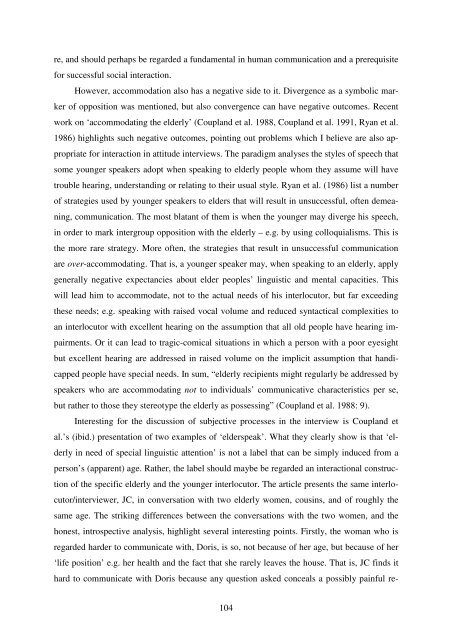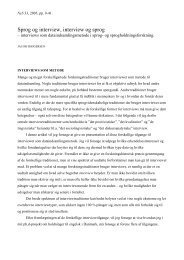Hør dog hvad de siger - Note-to-Self: Trials & Errors
Hør dog hvad de siger - Note-to-Self: Trials & Errors
Hør dog hvad de siger - Note-to-Self: Trials & Errors
You also want an ePaper? Increase the reach of your titles
YUMPU automatically turns print PDFs into web optimized ePapers that Google loves.
e, and should perhaps be regar<strong>de</strong>d a fundamental in human communication and a prerequisite<br />
for successful social interaction.<br />
However, accommodation also has a negative si<strong>de</strong> <strong>to</strong> it. Divergence as a symbolic mar-<br />
ker of opposition was mentioned, but also convergence can have negative outcomes. Recent<br />
work on ‘accommodating the el<strong>de</strong>rly’ (Coupland et al. 1988, Coupland et al. 1991, Ryan et al.<br />
1986) highlights such negative outcomes, pointing out problems which I believe are also ap-<br />
propriate for interaction in attitu<strong>de</strong> interviews. The paradigm analyses the styles of speech that<br />
some younger speakers adopt when speaking <strong>to</strong> el<strong>de</strong>rly people whom they assume will have<br />
trouble hearing, un<strong>de</strong>rstanding or relating <strong>to</strong> their usual style. Ryan et al. (1986) list a number<br />
of strategies used by younger speakers <strong>to</strong> el<strong>de</strong>rs that will result in unsuccessful, often <strong>de</strong>mea-<br />
ning, communication. The most blatant of them is when the younger may diverge his speech,<br />
in or<strong>de</strong>r <strong>to</strong> mark intergroup opposition with the el<strong>de</strong>rly – e.g. by using colloquialisms. This is<br />
the more rare strategy. More often, the strategies that result in unsuccessful communication<br />
are over-accommodating. That is, a younger speaker may, when speaking <strong>to</strong> an el<strong>de</strong>rly, apply<br />
generally negative expectancies about el<strong>de</strong>r peoples’ linguistic and mental capacities. This<br />
will lead him <strong>to</strong> accommodate, not <strong>to</strong> the actual needs of his interlocu<strong>to</strong>r, but far exceeding<br />
these needs; e.g. speaking with raised vocal volume and reduced syntactical complexities <strong>to</strong><br />
an interlocu<strong>to</strong>r with excellent hearing on the assumption that all old people have hearing im-<br />
pairments. Or it can lead <strong>to</strong> tragic-comical situations in which a person with a poor eyesight<br />
but excellent hearing are addressed in raised volume on the implicit assumption that handi-<br />
capped people have special needs. In sum, “el<strong>de</strong>rly recipients might regularly be addressed by<br />
speakers who are accommodating not <strong>to</strong> individuals’ communicative characteristics per se,<br />
but rather <strong>to</strong> those they stereotype the el<strong>de</strong>rly as possessing” (Coupland et al. 1988: 9).<br />
Interesting for the discussion of subjective processes in the interview is Coupland et<br />
al.’s (ibid.) presentation of two examples of ‘el<strong>de</strong>rspeak’. What they clearly show is that ‘el-<br />
<strong>de</strong>rly in need of special linguistic attention’ is not a label that can be simply induced from a<br />
person’s (apparent) age. Rather, the label should maybe be regar<strong>de</strong>d an interactional construc-<br />
tion of the specific el<strong>de</strong>rly and the younger interlocu<strong>to</strong>r. The article presents the same interlo-<br />
cu<strong>to</strong>r/interviewer, JC, in conversation with two el<strong>de</strong>rly women, cousins, and of roughly the<br />
same age. The striking differences between the conversations with the two women, and the<br />
honest, introspective analysis, highlight several interesting points. Firstly, the woman who is<br />
regar<strong>de</strong>d har<strong>de</strong>r <strong>to</strong> communicate with, Doris, is so, not because of her age, but because of her<br />
‘life position’ e.g. her health and the fact that she rarely leaves the house. That is, JC finds it<br />
hard <strong>to</strong> communicate with Doris because any question asked conceals a possibly painful re-<br />
104



